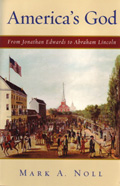
Mark A. Noll
Reviewed by: Christopher L. Spiker
Americas God: From Jonathan Edwards to Abraham Lincoln, by Mark A. Noll. Published by Oxford University Press, 2005. Paperback, 640 pages, list price $19.99. Reviewed by Christopher L. Spiker, a member of Calvary OPC in Glenside, Pa.
Noll writes that theology in America took on distinctly American characteristics with a synthesis of historical "republicanism" (valuing a society of free, virtuous citizens), "commonsense principles" (justifying beliefs as self-evident, intuitive truths), and evangelical revivalism.
A great evangelization began shortly after the Revolution, particularly among Methodists, and became the dominant cultural influence in the early United States. It was successful because it married evangelicalism to republicanism and commonsense principles. But in the quest to evangelize and exercise cultural and political influence, evangelicals lost their theological bearings. The Civil War signaled the failure of evangelicalism as the dominant intellectual influence in America. Noll's account of the assimilation of the church to American culture (chaps. 7-17) is informative and important for evangelical self-reflection today.
However, Noll relates this evangelicalism to Reformed thought in a curious way. He assumes that New England Puritanism represents the Reformed ideal of a "Protestant extension of Christendom" (p. 1 33). To be Reformed means to view God, self, and society as unified under a covenant, as in New England (p. 32).To be Reformed means to view God's providential rule as occurring through the church and to eschew tradition in favor of a biblical ordering of life (p.. 35). Reformed thought is democratizing: "The Reformed of every rank in society were expected to function as theologians" (p. 35).
In his last section, Noll claims that a major intellectual cause of the Civil War was the common use of "Reformed literalism" (pp. 404, 406) to defend slavery on the basis of Scripture (pp. 396-400). Noll misrepresents the principle of sola Scriptura, the Regulative Principle, and "the third use of the law" collectively as "all of the Bible, but only the Bible , for all of life" (p. 377, emphasis added).
While literalistic biblicism may well have been a problem with nineteenth-century evangelicalism, it was not a natural result of Reformed theology. Indeed, Reformed thought is too often a culprit in Noll's tragedy. In discussing alternatives to the failures of the evangelicals, Noll claims, "If, however, American Protestants had been able to heed Catholics [i.e. John Henry Newman] on the question of religious authority and the Bible, they would have found two different alternatives to the standard Reformed, literal hermeneutic" (p. 407). Noll recognizes that there were Old School Presbyterians, like Charles Hodge and Robert Breckinridge, who were more nuanced, but he claims that they were prevented from taking action "by the influence of the Regulative Principle (and especially in its Southern variation as 'the spirituality of the church')" (p. 416). If Noll had not misrepresented Reformed theology in this way, he would not have had to turn to Newman as an alternative. Whether Noll laments America's departure from a Reformed Christian ideal or blames American deficiencies on the presence of Reformed biblicism or antitraditionalism, the Reformed tradition he describes is seriously distorted.
I have additional concerns regarding the book. Nevertheless, it will prove useful if read critically. Noll has digested a mountain of information for us. Much can be gleaned from this volume, even if we must respectfully disagree with his representation of Reformed orthodoxy.
November 23, 2025
November 16, 2025
November 09, 2025
November 02, 2025
October 26, 2025
October 19, 2025
October 05, 2025
Raising Sexually Faithful Kids and
Parenting Boys and Girls in a Gender-Confused World
© 2025 The Orthodox Presbyterian Church